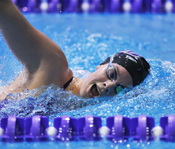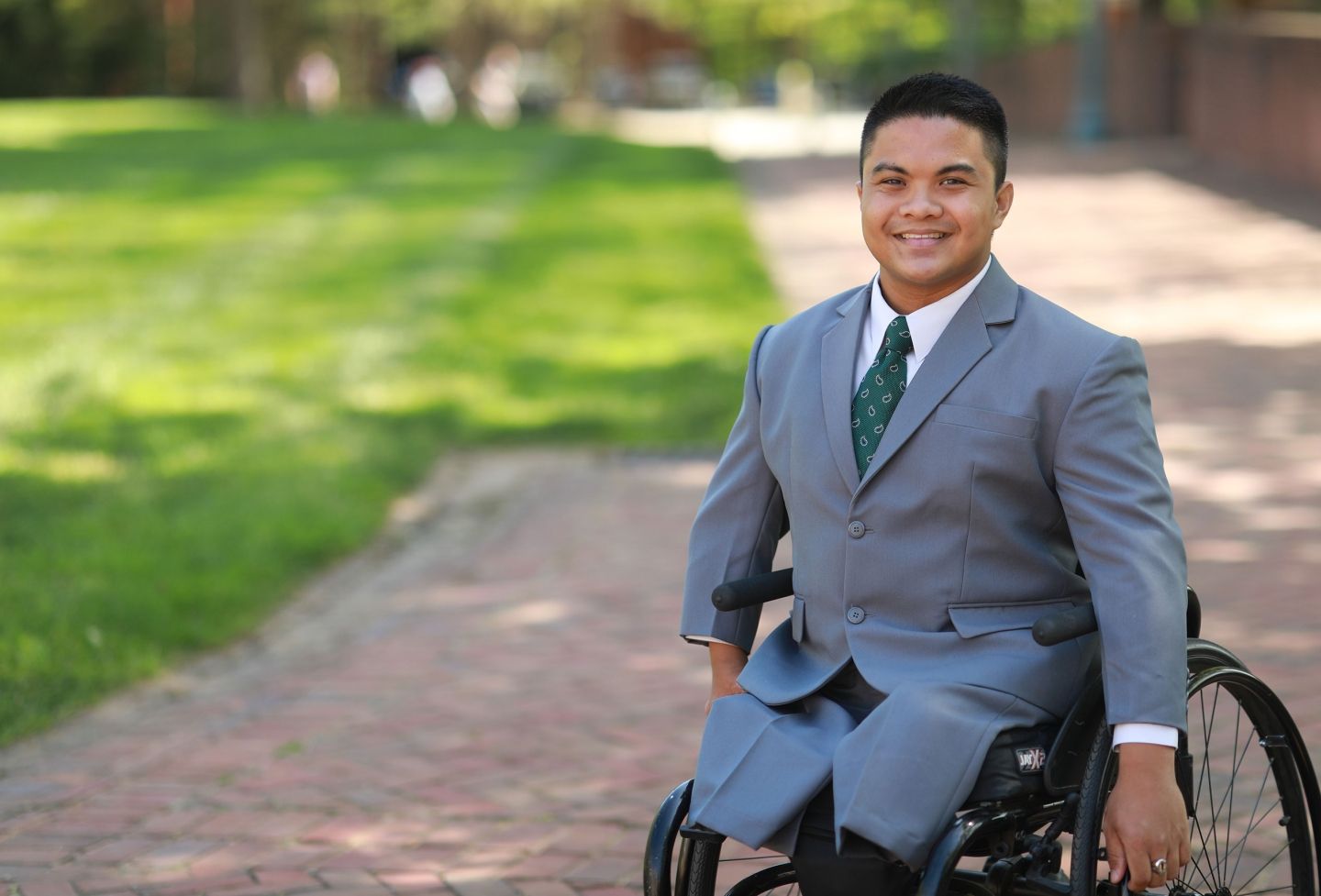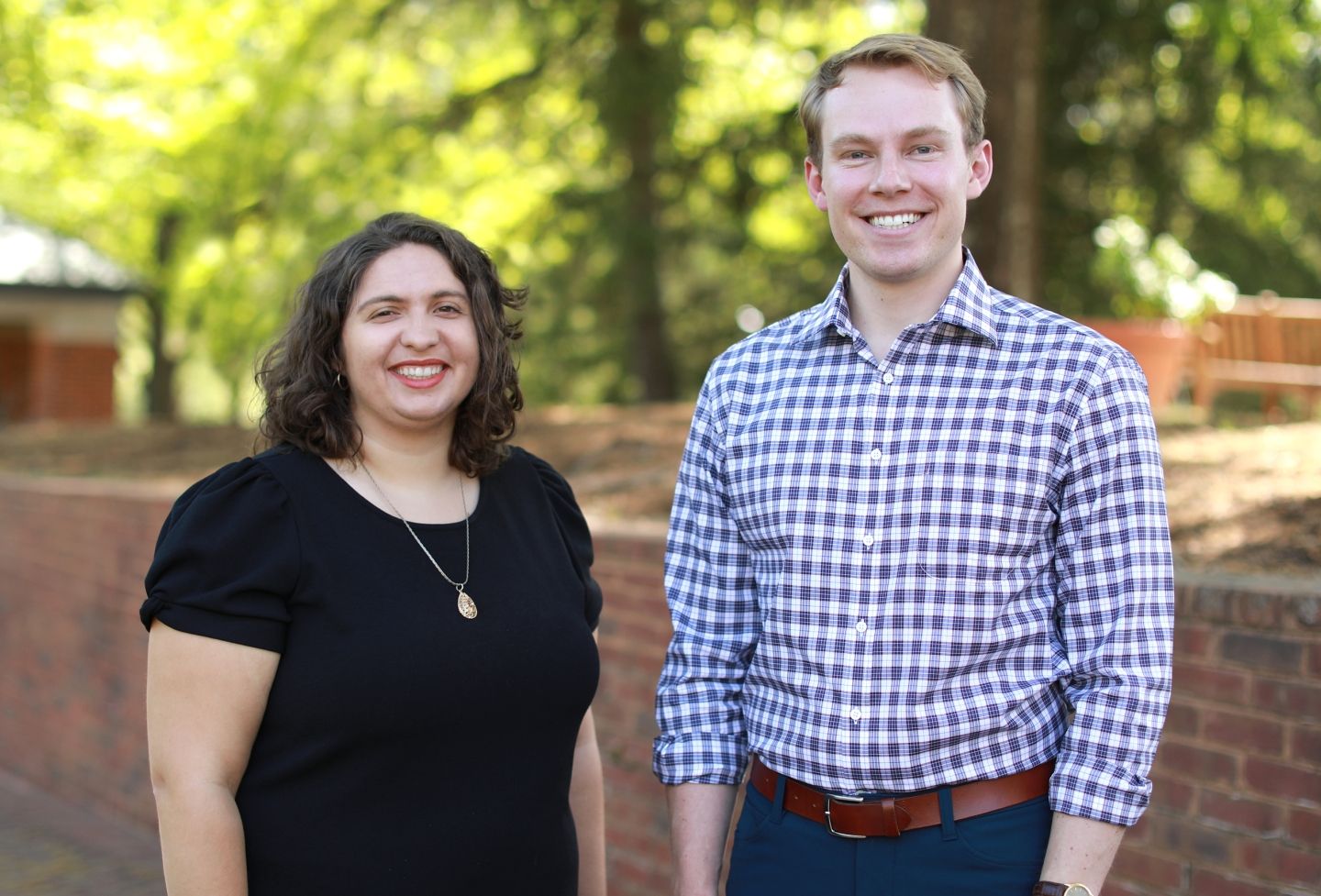Being a team leader comes naturally for third-year law student Claire Adkins, whether as an accomplished swimmer or as a mentor for classmates at the University of Virginia School of Law.
The Martinsville, Virginia, native earned a bachelor’s in political science from James Madison University and an LL.M. in international human rights law and practice from the University of York in England.
At UVA Law, Adkins is a Law and Public Service Fellow, submissions development editor for the Virginia Journal of International Law and a participant in the Civil Rights Clinic, and has previously served as a Legal Writing Fellow, a Peer Advisor and a research assistant for Professor Richard Schragger.
In our occasional series “Star Witness,” Adkins discussed how her parents’ community leadership put her on track to law school and her mission to make the most out of her final year in Charlottesville.
Tell us about your swimming career.
I started swimming at the age of 4. As a young child, I loved the water and had a natural ability to swim. Growing up, I spent most of my time in the pool, competing for the local YMCA. During my freshman year of high school, I joined the CCA Marlins, a club team located in Roanoke, to train and race more competitively. Six days a week, I drove from Martinsville to Roanoke, about two hours of driving each day. This experience came with sacrifices, such as missing my high school’s homecoming game, but it taught me discipline and allowed for me to become a more competitive athlete. I also competed for my high school swim team, as the sole member of the team. During my high school senior year, I won a state championship in the 200-yard freestyle.

I was fortunate to receive an athletic scholarship to swim Division I at James Madison University. Representing my school in competitions was a very rewarding experience. In high school, I often viewed swimming as an individual sport, focusing on my performance in the pool. But on JMU swim and dive, I swam for the team rather than only swimming for myself. I became more focused on being a good teammate and helping my teammates achieve their goals.
My swimming career ended on a high note when I won a Colonial Athletic Association championship title in the 400-yard individual medley and was named JMU Female Scholar-Athlete of the Year. During my senior year, I also served as president of JMU’s Student-Athlete Advisory Committee.
While I am proud of these successes, swimming for JMU provided me with much more than awards. I developed lifelong friends and grew as a person by developing leadership, resiliency and communication skills that have transferred to law school and work environments.
Why law school?
I decided to pursue a legal career to make a difference. From an early age, my parents, through their leadership roles, instilled in me the importance of community involvement. My mom, Kim Adkins, served as mayor of Martinsville when I was in high school and ran for the Virginia State Senate while I was in college. My dad, Jeff Adkins, has been a high school basketball coach for more than 30 years. From their influences, I wanted a career where I could be involved with and aid my community. In high school, I became specifically interested a legal career when my English teacher Candace Owen-Williams told me that she thought I had the skills to be a lawyer.
At JMU, I pursued this intertest by taking courses, such as Constitutional Law and International Law. I really enjoyed legal reasoning and research, and understanding the broad implications of court opinions. I also became specifically interested in human rights law, which converged my interests of legal studies and community involvement. Following my graduation at JMU, I pursued my Master of Laws in international human rights law and practice from the University of York in England. This fortunate experience provided me with cultural and global awareness, and solidified my interest in pursuing a law degree in the U.S.
Describe your most interesting law school experience.
As a Legal Writing Fellow for Professor Sarah Stewart Ware, I assisted first-year law students with legal research and writing. I edited students’ writing and met with them one-on-one to provide guidance throughout the school year. I learned tremendously from Professor Ware’s guidance on how best to tailor edits and advice to an individual student. I also learned how to be a better communicator and mentor.
I found serving as a fellow particularly valuable last year. Like most people, I found last year challenging. We had limited social interactions or in-person activities (due to valid health concerns). As a fellow, I was provided with opportunities to work with law students and bond with my co-fellows over editing experiences. This role provided normalcy and helped me focus on goals outside of the classroom. Overall, it was uplifting to see students’ progress throughout the year.
What’s next for you?
With this being my last year at UVA Law, I plan to take advantage of the great personnel at UVA by engaging with, and learning from, UVA’s professors, librarians and administrators before I leave. I also want to enjoy time with my fellow classmates, explore Charlottesville outside the classroom by taking hikes and visiting wineries, and hopefully play in a few UVA Law softball games.
For next fall, I have been fortunate to accept a clerkship with U.S. District Judge Norman K. Moon of the Western District of Virginia. After clerking, I plan to work at Hogan Lovells in Washington, D.C.
In terms of long-term career goals, I have a broad interest in pursuing civil rights and human rights work. During the summer following my first year of law school, I worked with the Disability Rights Section at the Civil Rights Division of the Department of Justice and found the work very interesting and rewarding. This past summer, I continued my interest in human rights by working on a pro bono asylum matter with Hogan Lovells. Hogan Lovells has an active pro bono practice, and I plan to pursue opportunities to work on asylum matters and civil rights cases while there. Because of my positive experience with the Disability Rights Section, I have an interest in pursuing work at the Justice Department at some point in my career.
Founded in 1819, the University of Virginia School of Law is the second-oldest continuously operating law school in the nation. Consistently ranked among the top law schools, Virginia is a world-renowned training ground for distinguished lawyers and public servants, instilling in them a commitment to leadership, integrity and community service.


